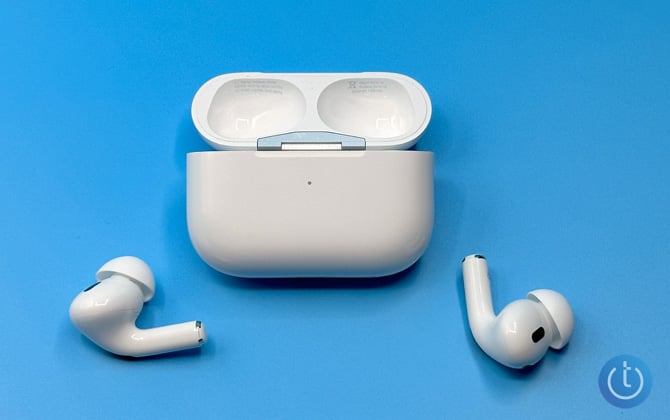Sometime in the next few weeks – or sooner – Apple will release a software update that will transform its popular AirPods Pro 2 into official FDA-authorized over-the-counter (OTC) self-fitting hearing aids.
So, if you think you need hearing aids, should you wait for the software upgrade or go ahead and buy a "normal" dedicated hearing aid, such as the new Sony CRE-C20 or one of the current Bluetooth-enabled OTC hearing aids such as the HP Hearing Pro?
Read more: Review: Sony's New CRE-C20 Are the Best OTC Hearing Aids I've Tested
If you already own AirPods Pro 2, I’d say wait to see how well they work for you. If you don’t, the choice isn’t so clear. There are a couple of drawbacks to using AirPods Pro 2 as hearing aids that may be dealbreakers.

How AirPods as hearing aids work
Instead of getting FDA approval for the AirPods Pro 2 hardware as OTC hearing aids, Apple applied for approval for their software to receive certification under the new FDA's Hearing Aid Feature (HAF) specification. Apple's HAF certification is intended to be used specifically with "compatible versions of the Apple AirPods Pro headphones" – currently the AirPods Pro 2.
Just like other OTC hearing aids, the AirPods Pro 2 includes a new "clinically validated" self-administered hearing test through iOS 18. Your hearing test results will then be programmed into your upgraded AirPods Pro 2. Your specific hearing profile will also be applied to Bluetooth audio, such as listening to music and movies from your Apple devices.
The benefits
One obvious advantage of the AirPods Pro 2 as a hearing aid is their price. Most current OTC self-fitting hearing aids start at around $1,000; the Bluetooth-enabled HP Hearing Pro buds have been the price exception at $499.
Read more: HP Hearing Pro OTC Hearing Aids: The Best for Music Lovers
By contrast, the AirPods Pro 2 cost just $250 (often on sale for $189) and include high-quality Bluetooth audio reproduction. They're also easier to pair and use thanks to their integration with the Apple ecosystem, which is familiar to millions of existing AirPods users.
Not all OTC self-fitting hearing aids include Bluetooth, such as the aforementioned Sony CRE-C20 or the varying Eargo models, which makes the AirPods Pro 2 an even greater bargain as a hearing aid. Many $1,000-plus rest-in-canal (RIC) OTC self-fitting hearing aids – the ones with the control and battery module behind the ear – include Bluetooth, but their music reproduction is, to put it kindly, less than adequate.
Read more: Our Review of the Eargo 7 All-Day Invisible OTC Hearing Aids
If you already own the AirPods Pro 2 and you have any questions about your hearing, you will be able to take a hearing test and discover immediately if you suffer from mild to moderate hearing loss. And, if you do need hearing aids, you already own them at no extra charge. From a societal health point of view, millions of people who might have been hesitant about discovering if they have hearing loss can now cheaply check and solve the problem on their own.
Finally, since there are millions of folks already walking around with those white sticks sticking out their ears, you could wear the AirPods Pro 2 as a hearing aid with no one the wiser. Like it or not, there is still a societal stigma attached to wearing standard hearing aids.
The drawbacks
The biggest drawback to the AirPods Pro 2 as hearing aids is their battery life. Rather than the "all-day" power (usually at least 16 hours) you get with standard hearing aids, the AirPods Pro 2 offer only up to six hours. This means you'll have to recharge the AirPods maybe three times a day if you need "all-day" hearing assistance.
However, most folks with mild to moderate hearing loss, the kind of hearing loss OTC hearing aids are designed to address, often only don hearing aids when they need them. So, the low battery life may not be a deal breaker for you.
A more critical potential drawback is the AirPods Pro 2's design, which seals the ear canal. Standard hearing aids are open, mixing ambient sound with amplification to create a natural, acoustic environment. With a good hearing aid, you hear the world as you would if you had magically regained your normal hearing, and you'll forget you're even wearing them. The canal-sealing AirPods Pro 2 need to digitize and "play" ambient sound through the earbuds. It's like using Transparency mode.
While the AirPods Pro 2's current Transparency mode is above average, it's still artificial. We don't know how the hearing-aid version will sound, but it could also seem as if it's all being funneled unnaturally through the buds. We'll review the AirPods Pro 2 as a hearing aid once the upgrade is available and let you know.
What about Android?
Google has been a bit slower in adding hearing-aid-compatible features to Android. However, according to the FDA, there isn't anything stopping Android bud makers and Google from duplicating Apple's effort. In fact, the FDA is encouraging interested parties to go through a process similar to Apple's and create their own Bluetooth earbud as a hearing aid solution.
When and how long it will take for an Android bud maker to join Apple and become an FDA-authorized software as a medical device hearing aid maker remains to be seen.
The bottom line
If you already own AirPods Pro 2, you can conduct your own test to determine if you need hearing aids and if they can serve as your hearing aid solution. If you don't own them, you can pick up a pair of the AirPods Pro 2 for $250 (often on sale for $189), and you get the bonus of excellent noise-canceling headphones for music and calls.
If the AirPods Pro 2 aren't right for you, I highly recommend the Sony CRE-C20 for non-Bluetooth OTC hearing aids ($999) with best-in-class sound and all-day wear. The HP Hearing Pro ($499) would be my budget pick, with good hearing amplification and Bluetooth music and calls.
[Image credit: Stewart Wolpin/Techlicious]
Stewart Wolpin has been writing about consumer electronics for more than 35 years, including news, reviews, analysis and history, and has attended and covered nearly 50 Consumer Electronic Shows and around a dozen IFA shows in Berlin. For the Consumer Technology Association (CTA), he is an elector for and writes the official biographies of the annual CT Hall of Fame inductees, and is the keeper of the industry’s official history.













